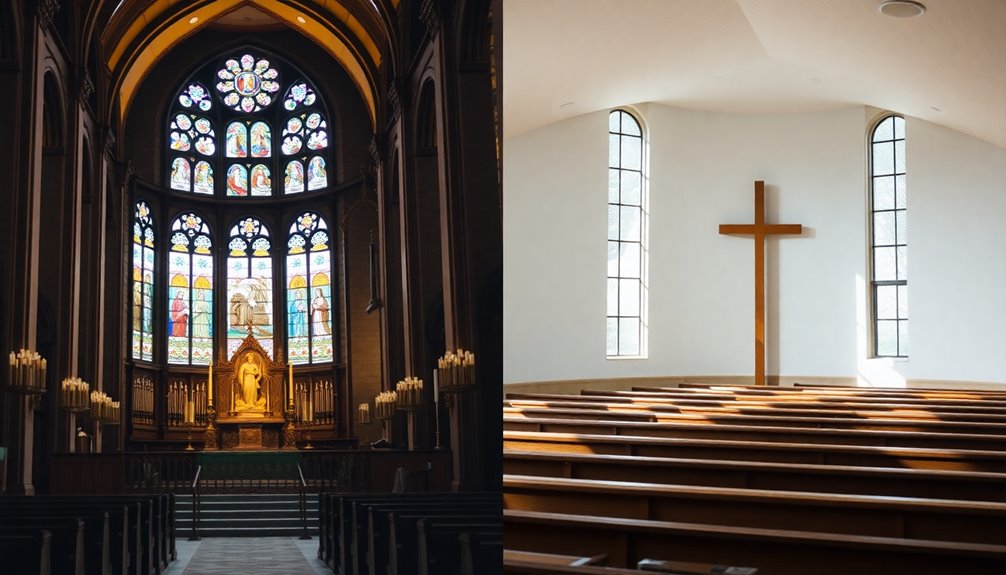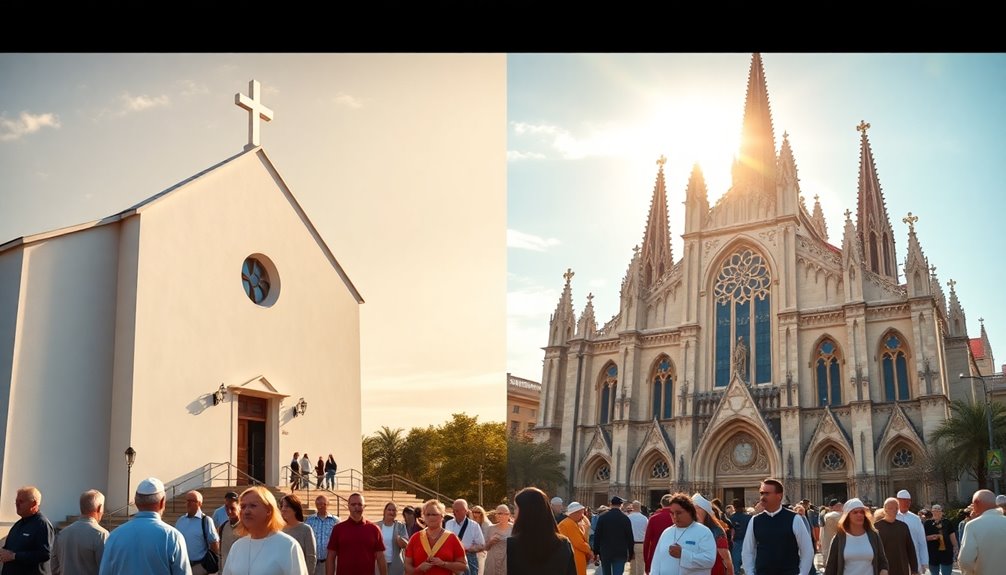Catholics are a branch of Christianity, but not all Christians are Catholics. The main difference lies in authority and beliefs. Catholics recognize the Pope as the spiritual leader, while many Christians favor personal interpretation of the Bible. In terms of salvation, Catholics emphasize faith, works, and sacraments, while other Christians often focus on faith alone. Catholics also follow a structured liturgy and seek intercession from saints, which is less common among other denominations. You'll find that exploring these distinctions reveals even more about how these faiths shape beliefs and practices.
Key Takeaways
- Catholicism is a denomination within Christianity, with approximately 1.3 billion adherents, while Christianity encompasses various groups, including Protestantism and Orthodoxy.
- Catholics accept the authority of the Pope and Church Tradition, whereas many Christians prioritize personal interpretation of Scripture and reject papal authority.
- Catholicism recognizes seven sacraments as essential, while many Protestant denominations acknowledge only two, viewing them as symbolic acts.
- The Catholic Church teaches the intercession of Mary and saints, while many Christians honor them but do not seek their intercession.
- Salvation in Catholicism involves faith and works, while many Christians believe in salvation by faith alone, emphasizing a one-time event.
Introduction
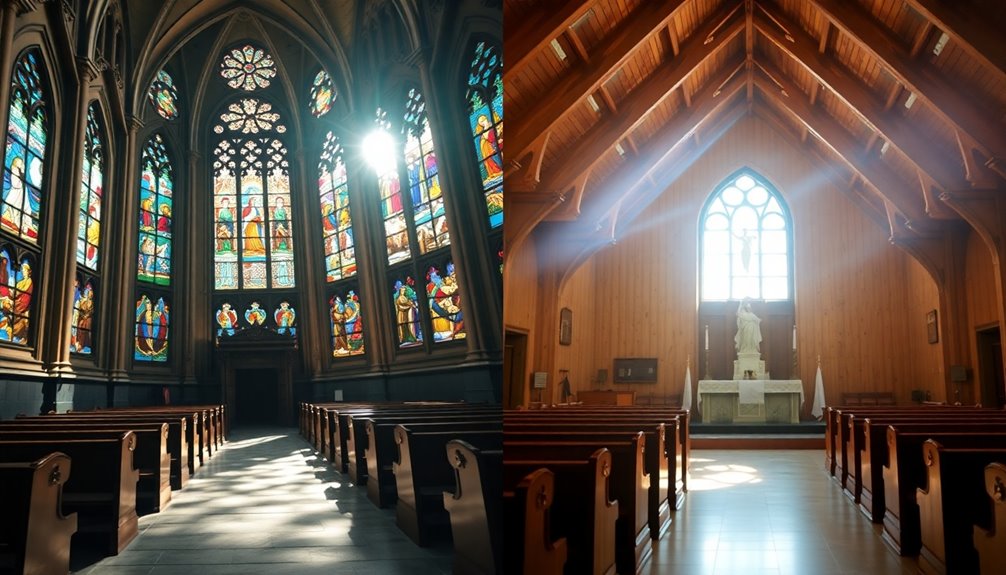
When you explore the difference between Catholicism and Christianity, it's essential to understand that Catholicism is a significant branch within the broader Christian faith.
With approximately 1.3 billion Catholics among the estimated 2.3 billion Christians worldwide, the Catholic Church stands as a major player in the global Christian community.
All Catholics identify as Christians, but not all Christians are Catholics, as Christianity includes various denominations, such as Protestantism and Eastern Orthodoxy.
One of the key distinctions lies in the authority within the Catholic Church.
Catholics recognize the Pope as the ultimate authority, a concept not embraced by most other Christian denominations.
This leads to differing views on salvation, where Catholics emphasize the importance of sacraments and traditions alongside faith.
As you delve deeper, you'll notice that worship practices differ significantly as well.
For instance, Catholics hold specific beliefs about the role of Mary and the saints, which further illustrate the distinctions between Catholicism and other forms of Christianity.
Understanding these nuances helps clarify how Catholicism fits into the broader Christian landscape.
Scriptural Authority Differences
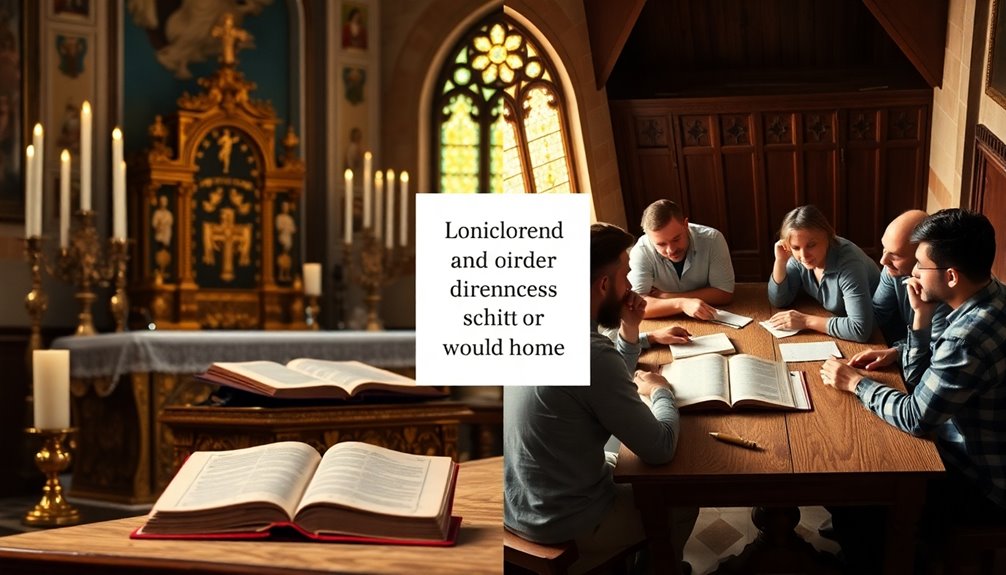
When you explore scriptural authority differences, you'll notice that Catholics and many Christians approach the Bible quite differently.
Catholics refer to both Scripture and Sacred Tradition as guiding principles, while many Christians rely solely on the Bible itself.
Understanding these distinctions, including which books are considered authoritative, can shed light on varying theological perspectives.
Primary Bible References
Scriptural authority is a key point of contention between Catholics and many Protestant Christians. Catholics assert that both Scripture and Church Tradition, as conveyed through the Magisterium, hold equal authority in guiding beliefs and practices. In contrast, many Protestant Christians emphasize "sola scriptura," believing the Bible alone serves as the ultimate authority (2 Timothy 3:16-17).
This divergence is further complicated by the inclusion of the Deuterocanonical books in the Catholic Bible, which Protestant versions omit, leading to different interpretations of key Scriptures.
Catholics often interpret the Bible within the context of Church Tradition, while many Christians advocate for personal interpretation, guided by the Holy Spirit (John 16:13). The Catholic Catechism highlights the importance of the Church's teaching authority for understanding Scripture, whereas Protestants promote the priesthood of all believers, encouraging individual engagement with the Bible (1 Peter 2:9).
Furthermore, Catholics view Matthew 16:18, which discusses Peter's role, as a foundation for papal authority. Many other Christians, however, see this passage as tied to a specific historical context rather than a basis for ongoing ecclesiastical hierarchy.
These differences illustrate the complexities of scriptural authority between the two faiths.
Secondary Bible References
Catholics and many Protestant Christians find themselves at odds over secondary Bible references, particularly regarding the role of tradition and the church in interpreting scripture.
In Catholicism, both Sacred Scripture and Sacred Tradition hold equal authority, guided by the Magisterium. This contrasts sharply with the Protestant doctrine of sola scriptura, which asserts that the Bible alone is the ultimate authority in matters of faith and practice.
The Catholic Bible consists of 73 books, including the Deuterocanonical texts, while most Protestant Bibles contain only 66. This discrepancy leads to different interpretations of scripture and theological guidance.
Catholics often look to the Catechism of the Catholic Church as a vital resource for understanding doctrine, whereas many Protestants rely strictly on the Bible.
Furthermore, the Catholic Church teaches that the interpretation of Scripture is best understood within the communal context of the Church, while many Protestant groups encourage individuals to interpret the Bible independently.
Key verses like 2 Timothy 3:16-17 highlight the sufficiency of Scripture, a cornerstone for Protestant belief, further emphasizing the divergence in how both traditions view scriptural authority and interpretation.
Medieval Church Influence
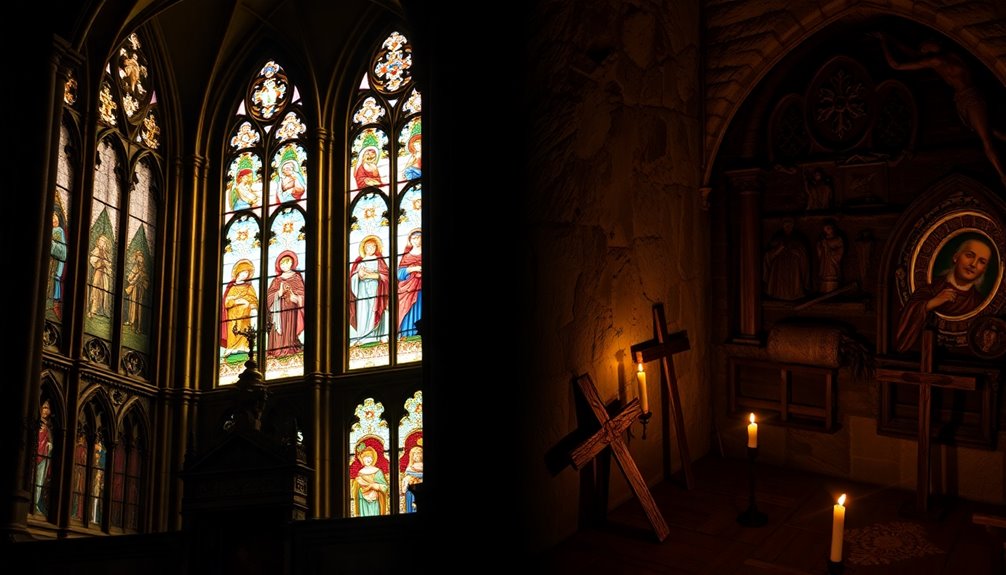
Throughout the Medieval period, the Roman Catholic Church held immense influence over European society, shaping politics, education, and culture in profound ways. As the dominant religious institution, the Catholic Church established a hierarchical structure with the Pope at its helm. This allowed the Church to wield significant political power, often dictating terms to monarchs and influencing government decisions.
The Church also played a crucial role in education, establishing universities and preserving knowledge during a time when literacy was scarce. It became the primary authority on educational matters until the Renaissance. Church doctrine guided not only spiritual life but also societal norms, although practices like the sale of indulgences sparked controversy and contributed to the Protestant Reformation.
Additionally, the Church led the Crusades, military campaigns aimed at reclaiming the Holy Land. These efforts mobilized European Christians under the banner of faith, showcasing the Church's ability to rally followers for a common cause.
The intertwining of the Catholic Church with the political and cultural landscape of the medieval period profoundly shaped the trajectory of the Christian faith and European history.
Sacraments' Significance in Faith
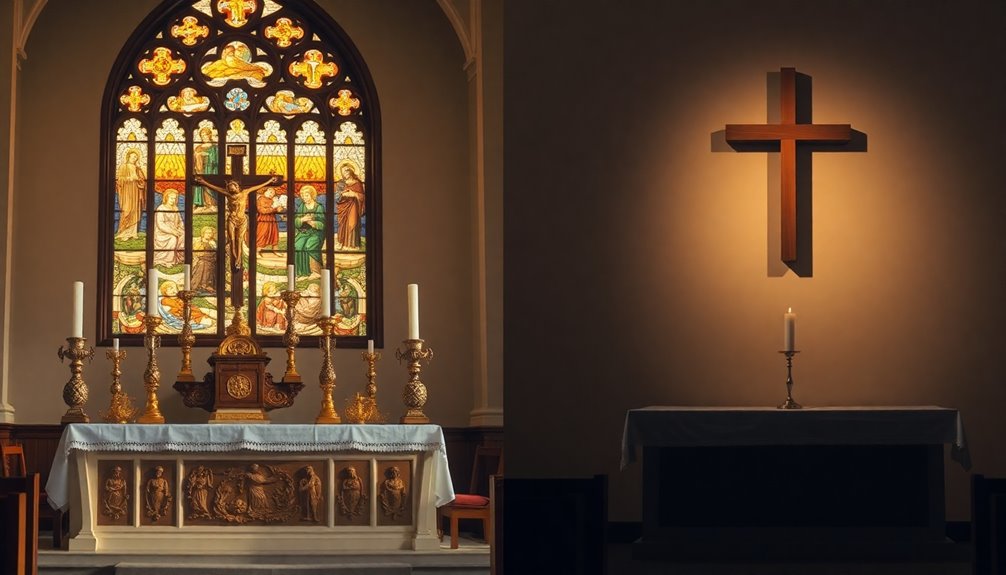
The role of sacraments in the life of faith varies significantly between Catholicism and other Christian denominations. In Catholicism, seven sacraments are viewed as essential means of grace, including Baptism, Eucharist, and Confession. The Eucharist, or Communion, stands at the center of Catholic worship, where it's believed to undergo transubstantiation, becoming the actual body and blood of Christ. This belief emphasizes the sacrament's significance in the journey toward salvation.
On the other hand, many Protestant denominations recognize only two sacraments: Baptism and Communion. For them, these acts are often considered symbolic rather than channels of grace.
In Catholicism, the sacrament of Confession, where you confess sins to a priest for absolution, plays a critical role in maintaining your relationship with God. In contrast, many Protestants emphasize a direct confession to God without intermediaries.
Furthermore, the Catholic perspective links sacraments closely to salvation, viewing good works as integral to faith. In many other Christian traditions, good works stem from faith rather than serve as a prerequisite for it.
Understanding these differences can deepen your appreciation for the diverse expressions of faith within Christianity.
Papal Authority and Infallibility
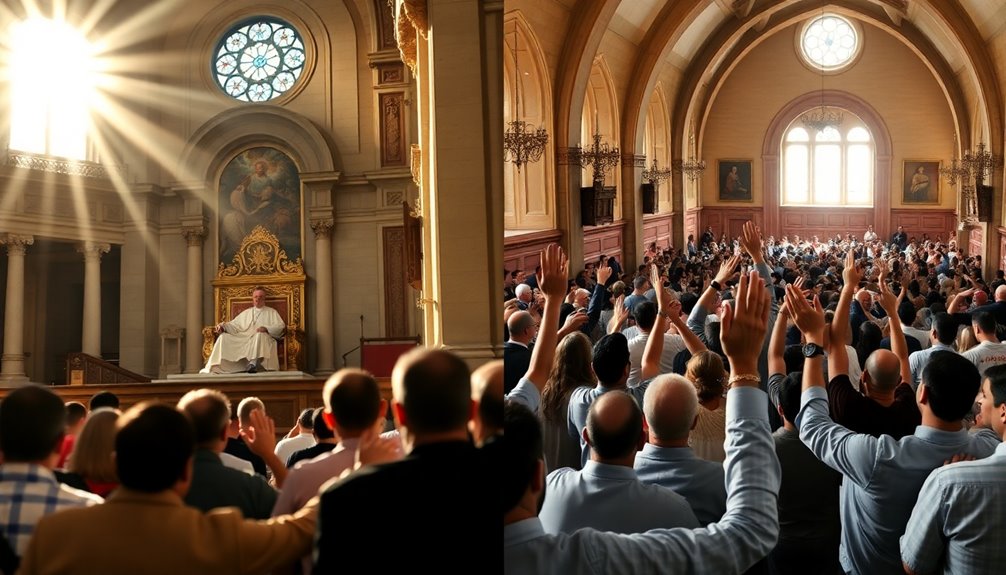
When discussing papal authority, you might encounter misconceptions about the Pope's role and the concept of infallibility.
Many people misinterpret what it means for the Pope to be infallible, believing it applies to all his statements rather than specific doctrines on faith and morals.
Understanding this distinction is crucial, especially when comparing Catholic beliefs to those held by other Christian denominations.
Papal Infallibility Misconceptions
Papal infallibility often sparks confusion and misconceptions, particularly regarding its scope and meaning. The Catholic Church teaches that this doctrine is about the Pope being preserved from error when proclaiming dogma related to faith and morals, but it only applies when he speaks ex cathedra, or "from the chair" of Saint Peter. This means it's not a blanket protection against all his statements.
Many people misunderstand papal infallibility as implying that the Pope is sinless or impeccable, but that's not the case. Infallibility strictly pertains to the Pope's authoritative teaching on specific matters, guided by the Holy Spirit.
Unlike the Catholic Church, Protestant denominations often emphasize personal interpretation of Scripture, leading to differing beliefs about authority and doctrine.
Historical instances of papal infallibility are rare, with only a few significant declarations, such as the Immaculate Conception of Mary and the Assumption of Mary.
Understanding this concept can help clarify the unique position of the Catholic Church in relation to the teachings of Jesus and the dogma that governs its faith.
Misinterpretation of Papal Authority
Misinterpretations surrounding papal authority often lead to confusion about its role within the Catholic Church. You might think that the Pope wields absolute power over all Christians, but that's a common misconception. Instead, papal authority is meant to uphold doctrinal unity and continuity within the Church. For Catholics, the Pope is the successor of Saint Peter, appointed by Jesus to guide his disciples.
Papal infallibility, as defined by the First Vatican Council in 1870, asserts that the Pope can't err when proclaiming essential dogmas of faith and morals. However, many Protestant Christians reject this notion, emphasizing individual interpretation of scripture as their primary source of authority. This distinction reflects broader theological differences between Catholicism and Protestantism, particularly regarding how faith and practice are guided.
Understanding papal authority within the context of the Catholic Church can clarify why Catholics hold the Pope in such high regard. Rather than an authoritarian figure, the Pope serves as a shepherd, ensuring that the teachings of Christ remain consistent throughout generations.
Recognizing these nuances can help bridge the gap in understanding between Catholics and other Christian denominations.
Faith in Daily Life
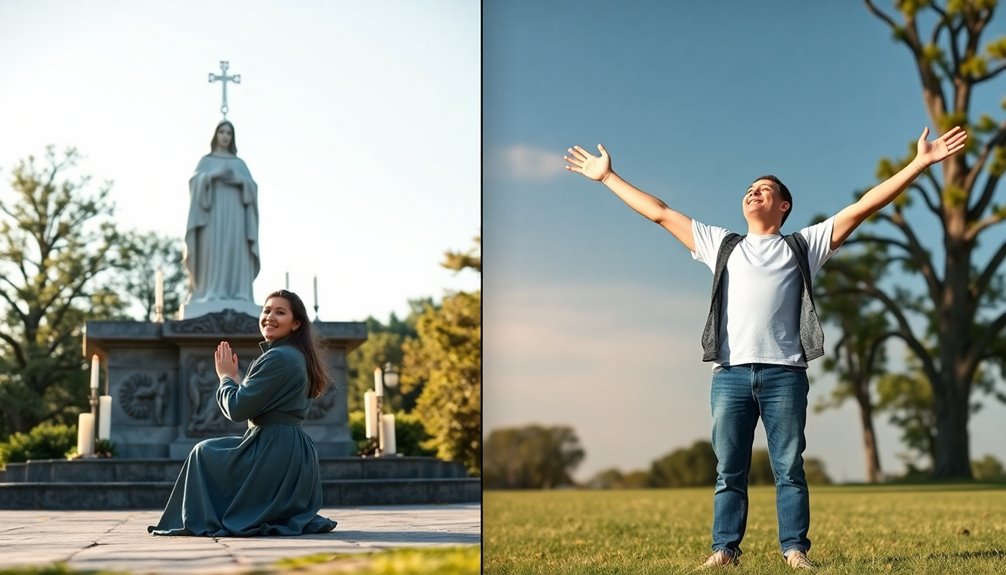
In your daily life, how you practice faith can vary greatly between Catholics and other Christians.
While Catholics often engage in structured daily prayers and sacraments, many Protestants might focus on personal Bible study and spontaneous prayer.
Both groups, however, share a commitment to local outreach programs, reflecting their beliefs through acts of service in their communities.
Daily Prayer Practices
Daily prayer practices play a crucial role in the lives of both Catholics and Christians, reflecting their unique beliefs and traditions.
In Catholicism, structured prayers are common, such as the Rosary, where you meditate on the life of Christ and the Virgin Mary. You might also find that Catholics set specific times for prayer throughout the day, including morning and evening prayers, along with the Liturgy of the Hours.
In contrast, many Christians from Protestant denominations often embrace spontaneous prayer, fostering a more personal and flexible approach to connecting with God. This means you can pray anytime, anywhere, without a formal structure.
While Catholics often seek the intercession of saints during their prayers, many Christians focus on praying directly to God through Jesus Christ, viewing Him as the sole mediator.
The Eucharist remains central to Catholic worship, with the Mass celebrated regularly, while Protestant congregations typically prioritize Bible study and sermons in their daily faith practices.
These differences in daily prayer practices highlight the diverse ways you can engage with your faith, whether through structured rituals or personal communication with God. Additionally, the act of prayer itself can serve as a form of emotional healing that provides comfort and resilience in times of distress.
Local Outreach Programs
Local outreach programs serve as vital expressions of faith in action for both Catholic and Protestant communities.
In Catholic communities, these initiatives often emphasize service to the underserved through food pantries, homeless shelters, and youth mentoring programs. You'll find that many parishes organize annual fundraising events to support local charities, showcasing a commitment to social justice and community engagement.
Catholic outreach programs frequently align with Catholic Social Teachings, which highlight the dignity of every individual and the importance of community participation. This focus encourages members to actively contribute to the welfare of those in need.
On the other hand, many Protestant denominations engage in local outreach as well, often concentrating on evangelism and community service. The approach can vary significantly based on the church's mission, but the underlying goal remains the same: to serve the community.
Collaborative efforts like ecumenical food drives and community clean-up days exemplify how both Catholic and Protestant churches can come together, fostering unity while addressing local needs.
Faith's Impact on Community
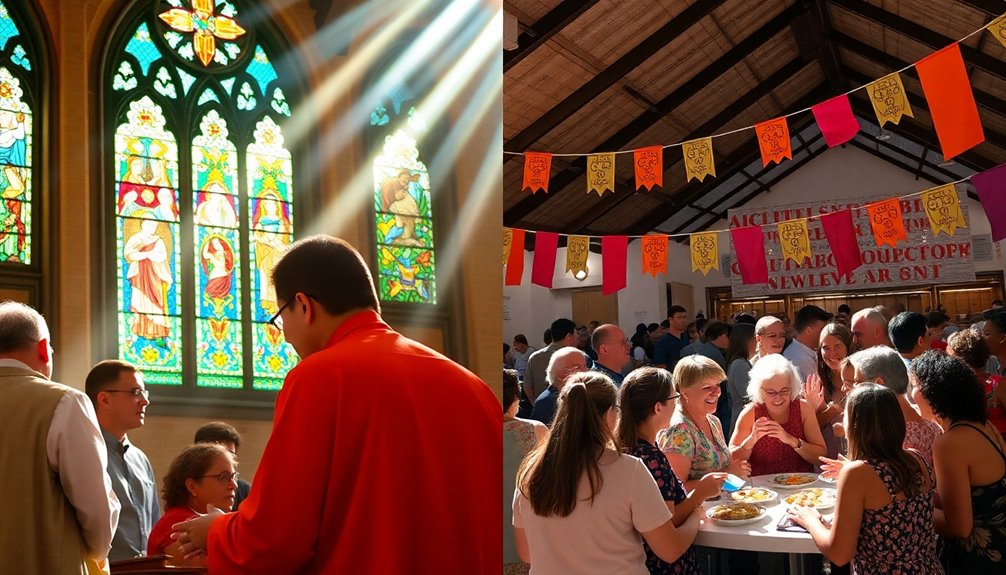
Fostering a sense of belonging, faith significantly impacts community life for both Catholics and other Christians. Your faith in Jesus Christ creates shared values that bind members together, whether in Catholic parishes or among various Protestant denominations.
In these communities, communal worship serves as a cornerstone, with Catholics partaking in the Mass, while Protestants engage in diverse service formats that encourage participation.
Catholic parishes often lead community outreach efforts, organizing food banks and charity drives that reflect their mission to serve others. Meanwhile, Protestant denominations emphasize individual faith journeys, resulting in unique practices such as Bible study groups and localized service projects.
These activities not only strengthen community ties but also empower individuals to contribute meaningfully to their neighborhoods.
Both traditions recognize the importance of collaboration through interfaith initiatives, which promote dialogue and understanding. By working together, Catholics and Christians can address social issues more effectively, building stronger connections within their communities.
Ultimately, faith's impact on community life enriches the lives of its members, fostering unity and shared purpose in the pursuit of a greater good.
Additional Resources
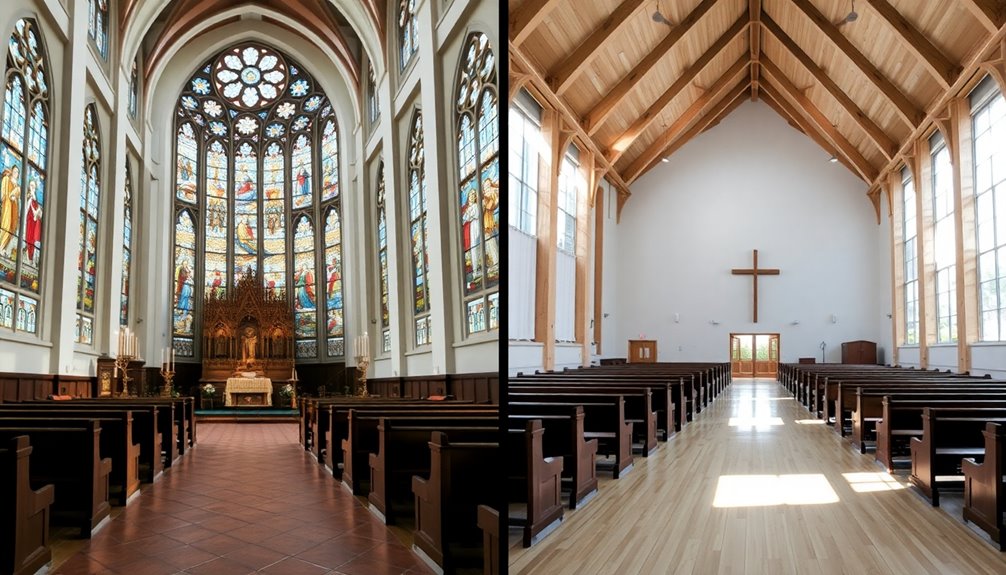
Understanding the differences and similarities between Catholicism and other Christian denominations can enhance your appreciation of both traditions. To dive deeper, you can explore the Catechism of the Catholic Church, which outlines Catholic doctrine and practices. It's a comprehensive resource that helps you grasp the beliefs held by Roman Catholicism.
Additionally, the Bible serves as a foundational text for all Christians, but you'll notice differences in the number of books included in the Catholic and Protestant versions. Familiarizing yourself with these variations can provide valuable insights.
You might also want to check out various ecumenical organizations, such as the World Council of Churches. These platforms encourage dialogue and understanding among different Christian denominations.
For online resources, Catholic Answers and Bible Gateway are excellent for educational materials and discussions about Catholic beliefs compared to other traditions.
Books like "Roman Catholic Theology and Practice" by Robert J. Stout and "What Catholics Believe" by John McCarthy further enrich your understanding. Through these resources, you'll gain a clearer perspective on the Sacred Scriptures and the intricacies of Catholicism alongside other Christian beliefs.
Frequently Asked Questions
What Is the Main Difference Between Catholic and Christian?
When you explore the main differences in religious beliefs, you'll notice varying views on authority, salvation, and practices.
Some focus on the Bible as the sole authority, while others incorporate tradition. You might also find that salvation can be seen as a journey involving faith and good works, rather than just a one-time gift.
Additionally, worship practices differ, particularly regarding the meaning and significance of the Eucharist in their communities.
What Do Catholics Believe?
Catholics believe in the importance of seven sacraments as essential to their spiritual life.
You'll find that they view salvation as a journey involving faith, good works, and these sacraments.
The Church's teachings, guided by the Magisterium, emphasize both Scripture and Tradition.
Catholics also honor Mary and the saints as intercessors, and they hold the Eucharist at the center of worship, believing in transubstantiation, where bread and wine become Christ's body and blood.
Is Jesus a Christian or Catholic?
Jesus isn't considered either a Christian or Catholic. He lived in the 1st century as a Jewish teacher, well before these terms existed.
You'll find that Christianity emerged after his death, based on his teachings and resurrection. While Catholics follow Jesus' teachings, they identify as part of Christianity, which encompasses various denominations.
What Is the Difference Between the Christian and Catholic Bible?
The primary difference between the Catholic and Christian Bible lies in the number of books included.
You'll find that the Catholic Bible features 73 books, while most Protestant Bibles contain 66.
Additionally, the Catholic Bible includes seven Deuterocanonical books that aren't present in Protestant versions.
When reading, you'll notice that Catholic translations often include footnotes and commentaries reflecting the Church's teachings, which can differ from interpretations in Protestant Bibles.

